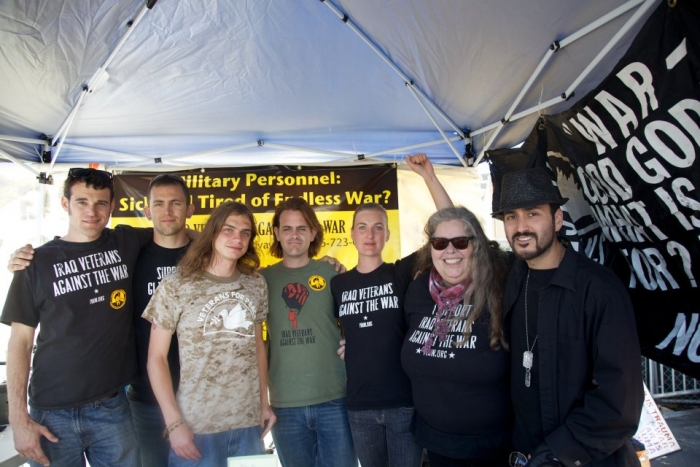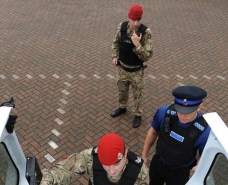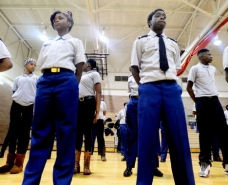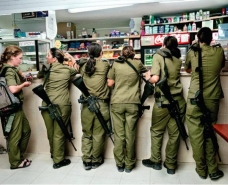The role of military veterans and current service members

Kelly Dougherty -
As long as there have been wars and the military, soldiers around the world have resisted, deserted, and refused combat duty for both moral and political reasons, and civilians have supported them. From the formation of the St. Patrick’s Battalion made up of soldiers who deserted the U.S. Army to join forces with the Mexicans during the Mexican-American War, to the Bonus Army in the 1930’s where thousands of U.S. veterans marched and occupied Washington DC demanding back-pay for their service in World War I, to the huge GI[1] resistance movement during the Vietnam war, the United States has a rich and varied legacy of military members refusing to be used by their government to further political and economic agendas. GIs are the work force that make war and military occupation possible and, as such, have a critical role to play as leaders in the struggle to end war and militarism.
Veterans and military service members bring unique perspectives and important experiences and knowledge to organising work aimed at countering war and militarism. They have an inside perspective on the military mindset and culture as well as first-hand experience with the day-to-day realities of war and occupation. In countries that are waging foreign wars, such as the United States, military members and their families are the part of the population most clearly and immediately impacted by those wars. Being the most affected and having the first-hand experience that they do, many GIs become disillusioned with the military and political rhetoric and are radicalised by their experience. These men and women are perfectly suited to challenge the stereotypes of war, the myth that war is heroic, and the wide-held belief that a sense of duty and patriotism should override any personal, moral or political considerations. Often, people who haven’t served in the military are reluctant to criticize the military for fear of appearing to be against the troops. When a veteran who has taken part in war tells their story and calls war out for the violent, corrupt, dehumanising sham that it is, it inspires and encourages both civilians and other veterans to voice their similar beliefs and lets them know that they are not alone. Service members and veterans are also well suited to challenge civilians to confront their own responsibility and complicity in the wars that their nation is waging. The soldier may be the bullet, so to speak, but the nation’s population is the force aiming the gun. When men and women in the military withdraw their support for war and militarism, they have the potential to destabilize the entire system and shift the balance of power.
Having a network of non-military allies to support, work and learn with is essential for veterans and service members who are organising around issues of militarism. Many times, however, this is difficult. Civilians often don’t know how to approach military people, and veterans often find it difficult to relate to people who are detached from the realities of war and military service. Many veterans want to move on and put their military experience behind them. A huge number of veterans are dealing with the often-debilitating effects of military trauma, including Post Traumatic Stress Disorder, traumatic brain injury, military sexual trauma, and other mental and physical wounds. They may struggle just to survive from one day to the next and are not healthy enough to participate in any additional activities, especially those that will force them to confront the traumatic experiences from which they are trying to heal.
Most veterans who want to become actively involved in anti-militarism have never been involved in organising and activism before and may bring a lot of enthusiasm, but little experience of and familiarity with the culture of social justice activism. This can cause the veteran to feel like an outsider, since they are unfamiliar with the norms, language and history of this specific sub-culture. Also, veterans often feel stereotyped, marginalized and tokenized by civilian activists. For example, in the early years of Iraq Veterans Against the War, our members were often asked to speak about their experiences in Iraq, but they were not asked to participate in the planning and organising of actions. This made many veterans feel like people in the anti-war movement were using them to validate their own legitimacy instead of considering them as equal participants. Experiences like these serve to further enforce an idea perpetuated in the military that civilians aren’t to be trusted and that they will never understand or care about the sacrifices and experiences of soldiers. Conversely, civilian activists may be mistrustful of veterans and service members and angry with them because of their willing participation in war and occupation. For someone with experience organising in anti-oppression and anti-militarization circles, they may be shocked and offended by the often sexist, bigoted, and disrespectful attitudes that veterans may bring with them in their transition from soldier to activist. Civilian activists may be unsure of how to confront a veteran about offensive, unhealthy behaviour that is commonplace and normalized in military culture, as it often is in society at large.
In order to confront and overcome these obstacles to working together, civilians and veterans must approach one another with openness and the willingness and ability to listen to each other. This helps to build strong relationships where people can better learn from each other and create strong alliances and campaigns. Iraq Veterans Against the War works closely with veteran and non-military organizations and groups alike, including the Civilian Soldier Alliance, Veterans For Peace, Military Families Speak Out, Afghans For Peace, the Occupy movement, and various labour and human rights groups. Just as the veteran or service member brings crucial experience and perspective to organising work, the civilian often has a wealth of experience and their own unique connection to issues of war. People who have been involved in anti-militarism work have experience organising around social justice issues, building campaigns, can offer perspective and analysis of larger systems of oppression, and have historical knowledge of popular movements that have confronted systems of injustice. They may also have their own very personal connections to the devastating consequences of war and can share this perspective with the veteran.
These men and women can help to integrate the warrior back into society and encourage and facilitate positive and meaningful actions that can be very healing, empowering and reconciling for a veteran. As we narrow the divide between civilians and soldiers, it becomes easier to narrow the divide between anti-militarism issues and other issues dealing with exploitation and injustice, from environmental degradation to economic inequality. For example, the U.S. occupation of Iraq has everything to do with melting polar ice caps, economic austerity in Greece and sweatshop working conditions in Bangladesh. When we begin to see the commonalities linking our experiences and issues to those of other groups, we become better equipped to engage in the sort of transforming and organising that can dismantle systemic oppression.
The work of Iraq Veterans Against the War, in particular, has focused on withdrawing military support from the wars in Iraq and Afghanistan. IVAW was founded in 2004 by a group of Iraq veterans who returned from Iraq angry and disillusioned by their experiences and wanted to work with others to end the occupation. From its founding, IVAW has called for three things: the immediate withdrawal of all occupying forces from Iraq, full benefits for returning veterans, and reparations for the Iraqi people. Since 2009 IVAW has included withdrawal from Afghanistan and reparations for the Afghan people in these points of unity. Our organization has undergone much change and growth during the past eight years and we are currently undergoing an internal strategy process to assess how best to structure our organising work as we move forward.
One of the ways that IVAW members have worked to withdraw military support from the wars is to do counter recruiting, or 'truth in recruiting', work. Military recruiters at best give potential recruits a very one-sided view of military service. At worst, recruiters lie and mislead prospective recruits in the hope of getting more young men and women to enlist. For example, recruits will often be told by recruiters that they will not be deployed or, if they are, that they won’t be on the 'front lines.' A recruiter can never guarantee where a person, once enlisted in the military, will serve and, in today’s wars, there are no front lines and cooks can be killed just the same as infantrymen. Recruiters are given broad access to high school students and are present on many high school campuses. Many young people see joining the military as the only way of getting a job, earning money for college, or getting out of their town or out of a dangerous neighbourhood.
Many IVAW members joined the military for these reasons and have experienced the lies and half-truths of military recruiters. Our experiences have shown us that the reality of military service is often unrecognisably different from the picture painted by recruiters, military advertising, and civilian perception.
Many veterans find it very rewarding to be able to offer young people a different viewpoint, one not influenced by the pressure to meet recruitment numbers. IVAW members have spoken to students across the country, from elementary school students to university students. I've done this many times. The simple act of telling the story of your military experience, your experience in a war zone, and the difficulties you face when you come home and leave the military, can have a profound effect on young people who have never heard anyone talk about their military service outside of the patriotic, black and white lens of the military establishment. Speaking candidly about military realities to young people is a way for veterans to share viewpoints and perspectives that were never shared with them and it can mean the difference between deciding to join the military and deciding to choose another path.
IVAW uses the term 'truth in recruiting' to convey the sentiment that young men and women have a right to be well-informed of the risks and realities of military service. We’ve pressured high schools to let us set up counter recruiting tables to act as a balance to the heavy presence of military recruiters. We’ve collaborated with other organizations, such as the American Friends Service Committee, to create counter-recruitment videos and literature. We’ve organized actions at military recruiting centres to protest about misleading, dishonest recruiting practices. There are many ways to withdraw military support from the wars, and truth in recruiting is one way that many IVAW members find to be incredibly rewarding.
I was recently invited to speak with an Afghanistan veteran at a high school by two students and their teacher. The students were feeling frustrated that the only military speakers to come to their school had been unquestioningly pro-military and they had experienced a September 11th commemoration event that was hyper-nationalistic with no nuance or retrospection. They felt that their student body was being done a disservice and should be presented with alternative, critical viewpoints. Throughout the day, we spoke to the entire student body during an assembly and more in-depth to individual classes. We were able to have discussions, to challenge and be challenged, in a way that the students’ never had with any of the other military centred speakers or events before. I’ve also spoken to elementary-school children about the Iraq war. This was a challenge because it’s difficult to know the best way to speak to children about the violent realities of war and the military. One year, my Iraq veteran friend and I used a role-play activity to show what it might be like for the children to be the subject of a raid and search. We wanted to show the unfairness of targeting mass populations in a way that wasn’t too scary or graphic. Since the Unites States is a very militarized country, we are taught at a young age to unquestioningly support the military and government and have simplistic myths about war reinforced on a daily basis. By offering young people, regardless of their age, an alternative perspective and story, we have an opportunity to make an impact that will foster critical thinking and encourage more people to challenge the militarism of our culture.
Over the past two years, IVAW, working closely with the Civilian Soldier Alliance, has focused on the Operation Recovery campaign, which focuses on the right of service members and veterans to heal from military trauma. This campaign is structured on the transforming, organising model, which seeks to not only win a specific gain, but to transform individuals and society through empowerment, an understanding of our humanity, and common human rights-based values. By focusing on an issue that many people can support, namely that service members who’ve been injured mentally or physically due to their military service should not be forced to redeploy to combat zones or otherwise engage in activities that further injure and traumatize them, we have the opportunity to address larger issues of militarism. Asserting your right to heal from trauma is often a revolutionary act for a service member to take. The military enforces the idea that your individual needs and concerns are irrelevant. What matters is following orders and doing what needs to be done to accomplish the mission, whatever your commanders or political figures decide that mission to be. You are a GI, a piece of government property to be used and abused as the military sees fit. If you’re on your fifth combat tour and you have to ingest a handful of psychotropic drugs just to get out of bed and go on your patrol in Afghanistan, you’re expected to do it for the sake of 'mission accomplishment' and 'the good of the nation'. If you’ve been raped by a man in your unit, you’re expected to shut up about it and continue working as though nothing happened so you don’t damage 'unit cohesion'. If you go to sick call to see a doctor because you’re in physical or emotional pain, you’re labelled as 'weak' and accused of faking illness in order to get out of doing your duty.
As the military dehumanizes its soldiers it creates an environment and mentality that makes it easier for the soldiers to dehumanize the people in the countries they are occupying and bombing. Asserting our right to heal is a way to assert our humanity and reject the violence of military culture. It allows us to talk about how being denied the right to heal is a human rights violation, how it is a symptom of a patriarchal, militaristic capitalist system that values the consolidation of wealth and power over all else and is, by its nature, destructive, oppressive, and maintained by systemic violence. We are working to not only gain changes in military policy, but to build a service member and veteran led movement that ends militarism by transforming ourselves, military culture and American society.
The militarism and violence that IVAW is organising to dismantle is not just an American phenomenon or U.S. problem. The hegemonic system that uses military force for economic and political gain is exploiting, oppressing, and killing people and ecosystems worldwide. People in communities across the world continue to resist this violence and destruction in whatever ways they can. For those of us focusing our energy on issues of militarism, it is essential to engage and involve the soldiers and veterans who have been an integral part of that system as they grow from being a cog in the machine to being a wrench in the machine, so to speak. When you realize that you’ve pointed a rifle in the face of a child or old woman so that a corporation could make a profit, that you’ve hated and dehumanized a whole group of people and that the experience has made you hate yourself, that you’ve compromised your own morals and values in order to be a good soldier and follow orders, you have an opportunity to use those experiences to expose the horrors of war and work with others to make positive changes.
Notes
[1] 'GI' is a term meaning 'Government Issue' that came into use in the US during World War I to refer to military personnel and their equipment. The term emphasises service members’ status as pieces of property belonging to the government.
Source: http://www.wri-irg.org
Countering Military Recruitment

WRI's new booklet, Countering Military Recruitment: Learning the lessons of counter-recruitment campaigns internationally, is out now. The booklet includes examples of campaigning against youth militarisation across different countries with the contribution of grassroot activists.
You can order a paperback version here.








